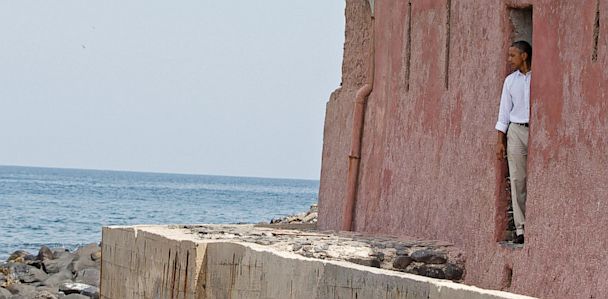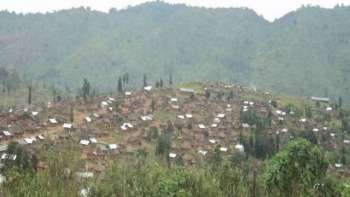Next week, on January 20th, 2017 we will say goodbye to President Barack "Baraka" Obama. Baraka means blessings in Swahili. He has been blessed. We all have been blessed to have him as our president. Back in 2004, even before he became president, AfroAmerica Network made him AfroAmerica Network Black Man of Year 2004.
As President Barack Obama is about to return to the life of a simple citizen, what a better tribute than revisiting what we wrote then, in 2004, when very few people dared to believe he will become the first Black President of the most powerful country in the World? Here is what I, for AfroAmerica Network, wrote then when I was asked to talk about one of the most amazing American public figures:
Baraka “Barack” Obama, AfroAmerica Network Black Man of the Year 2004.
The “skinny man with a funny name” that is how Baraka Obama qualifies himself. And people wrongly or willingly called him “Alabama or Yo Mama.” Nonetheless this half-Kenyan Columbia and Harvard Law School graduate ended up being elected this year as the only black and first black man US Senator after wowing the Democrats with a charismatic conference speech and flocking conservative republicans from Illinois to the polls.
Born in Hawaii, from a Kenyan student and a Kansas teacher, his life is itself quite a history. Too much has been written about him.
Following is what we wrote back on September 1, 2004 in our article titled: Baraka Obama, from goat shepherd to US Congress: “ I will make you the shepherd of man”.
I just came from Africa. I mean: the HEART of Africa, from where the human exodus, that led to the conquest of the World as we know it today, started. In fact, according to the latest archaeological and biological discoveries, the human race today comes from one woman: A black woman, who once lived in African savannas. Brief, we are all black men and women. That is what Science tells us today.
Science also tells us that the woman, also known as Africa Eve, lived in Eastern Africa, somewhere in the region today know as Kenya, Uganda, Tanzania, Rwanda, Burundi, Sudan, and Ethiopia. Maybe she was a Masai, or a Bantu, or both, before the history did them apart. When I was in Darfur, I wondered whether the African Eve and her companions were Fur fleeing the Janjaweed militia to be able to cross the Yemen strait without boats. I mean, the Zaghawa, Masalit, and Fur people looked to me as very peaceful true black people minding their own quiet life in the very beautiful plateaus and mountains of Jebel Marra.
If one can truly believe in Science, people cannot imagine how little, despite wars, western influence, schools, industries, cell phones, computers, etc. has changed. The way I found the people there pretty much resembles the image I made of them looking at the pictures from PBS and BBC relating the exodus. If you want to see by yourself, then visit the Massai in Kenya and the people on the foot of Mount Kilimandaro in Tanzania, and the fishermen on Lake Tanganyika. Travel North West to the shores of Lake Victoria. Rwandans I met in Kampala told me the lake is actually known as (I only remember the translation) “the Locusts Killer”. According to a tale or reality (who can tell apart facts and fictions in Africa), colonies of locusts periodically swarming across Eastern Africa devastating fields of crops, reach the shores of the lake to end up drowning in the lake. The lake has actually become the protector of crops from locusts. That is the way in Africa: Men and women protecting Nature and Mother Nature returning the favor!
Visit the region and you will be taken away by the simplicity of life there. I met women carrying pots on their head by some magical law of equilibrium. I met farmers, herders, city dwellers, and people in between, pretending to be Western. In Nairobi, I met Jay-Z, Puff Diddy, Beyonce, and Usher wannabes. I met a prince of pop looking like a Michael Jackson’s twin and, believe me, with veils, umbrellas, glove, entourage, and all. In Zanzibar, I was almost ran over by a donkey.
What is the point? You may ask. The point is I found that almost all Africans from the rural areas are goat herdspersons or herdspersons of something. And that brings me back to the title of the article: the fact that in the US people say it is a miracle that Obama, a descendent of an African goat herdsman, rose to become one of the most influential Blacks in America is an oxymoron. Most Africans, including the brightest and the dictators, the warlord, and the corrupt bureaucrats, these American University professors or Banking executives, the Harvard and Princeton educated elites or Harlem braids women are descendent of goat, or cow, or sheep, or donkey herdsmen.
I found that some herdsmen are more adventurous, or smarter, or luckier, or all of the above than others. It is like everywhere really! Obama’s father was one of these goat herdsmen who rule Africa.
He came to the US with education seeking more education and opportunity. He conquered both the education and the heart, literarily, of the Americans. And the result is Baraka Obama.
This does not remove the fact that Baraka Obama is a very successful story. He is the epitome of the arduous roads many successful blacks take in America. It is said that behind every successful man there is a woman. Well, besides a woman, behind every successful Black Man in America there is also a secret untold story. I contend the untold story behind Obama’s success coming from a father being a goat herdsman, than overcoming adversity that came from being a Black Man in America and embracing the positive things that came out of it. After all we all are descendants of herdsmen.
by David O'Brian
©AfroAmerica Network, December 2004.
For contact, please e-mail us:
















